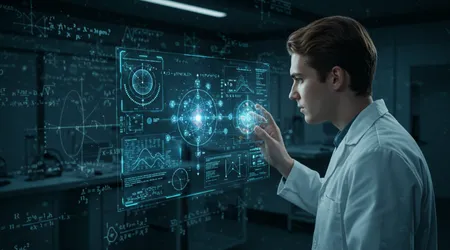The Role of Observer in Quantum Mechanics

Role of Observer in Quantum Mechanics shapes our understanding of reality itself. Quantum mechanics, a cornerstone of modern physics, challenges intuitive notions about the universe.
Anúncios
Unlike classical physics, where objects exist independently, quantum theory suggests observation influences outcomes.
This phenomenon sparks profound philosophical questions about reality, perception, and existence. Why does the act of observing alter the state of particles?
This article dives into the intricate dance between observer and quantum events, exploring its implications with clarity and depth.
From Schrödinger’s cat to cutting-edge experiments, we’ll unpack how observation molds the subatomic world, blending science with philosophical inquiry to engage curious minds.
The Quantum Observer Effect: A Paradigm Shift
Observation in quantum mechanics isn’t just passive watching. It actively shapes particle behavior. The famous double-slit experiment illustrates this vividly.
When unobserved, electrons create wave-like patterns; when measured, they act like particles. This duality hints that the Role of Observer in Quantum Mechanics is pivotal.
Observation collapses a wave function, fixing a particle’s state. Without it, particles exist in superposition, embodying multiple states simultaneously. This defies classical logic, suggesting reality at its core is fluid until pinned down by a conscious act.
The implications ripple beyond labs. If observation defines reality, what does this mean for free will? Our choices in measurement could dictate physical outcomes.
This interplay challenges deterministic views, inviting philosophical debates. The observer effect doesn’t just alter experiments; it questions the nature of existence itself.
++ The Fermi Paradox: Where Are All the Aliens?
Quantum mechanics forces us to reconsider how deeply human perception intertwines with the cosmos.
Recent studies, like those at the Perimeter Institute in 2025, emphasize this. Researchers found that entangled particles respond to observation across vast distances.
This reinforces the observer’s role, showing measurement isn’t just local but universe-spanning.
The Role of Observer in Quantum Mechanics thus becomes a bridge between science and metaphysics, urging us to explore consciousness’s place in the universe.

Schrödinger’s Cat and the Observer’s Paradox
Imagine a cat in a box, its fate tied to a quantum event. Schrödinger’s thought experiment illustrates superposition brilliantly. Until observed, the cat is both alive and dead.
The Role of Observer in Quantum Mechanics resolves this paradox. Opening the box collapses the quantum state, determining the cat’s fate. This isn’t mere theory it mirrors real quantum systems where observation dictates outcomes.
Philosophically, this raises questions about reality’s independence. Does the universe require observation to exist? John Wheeler’s “participatory universe” suggests it might.
His idea posits that observers give reality its structure. Without measurement, quantum systems remain undefined, like an unwritten story awaiting a reader. This perspective elevates the observer to a co-creator of reality.
Consider a practical example: quantum computing. Qubits, the building blocks, rely on superposition. Observing a qubit collapses its state, affecting computations.
Also read: Can We Ever Know the Truth About the Universe?
Engineers at IBM in 2025 reported stabilizing qubits longer, but observation still disrupts delicate quantum states.
This underscores the Role of Observer in Quantum Mechanics, showing its tangible impact on technology and our understanding of existence.
Measurement Problem: The Heart of the Debate
The measurement problem lies at quantum mechanics’ core. Why does observation collapse a wave function? No definitive answer exists, yet theories abound.
The Copenhagen interpretation, dominant since the 1920s, argues that collapse occurs upon measurement, with the observer central. But what counts as an observer? A human? A machine? This ambiguity fuels debate.
Decoherence offers a partial solution. It suggests environmental interactions cause apparent collapse, reducing the observer’s role.
Yet, experiments like those at MIT in 2024 show conscious observation still matters. Photons in entangled states shifted behavior when measured deliberately.
Read more: Is Reality Subjective? Quantum Physics and Perception
This implies the Role of Observer in Quantum Mechanics isn’t easily dismissed, even with decoherence.
Philosophically, this problem probes consciousness. Does sentience drive collapse, or is it merely physical interaction?
An analogy helps: think of reality as a cosmic play, where the observer’s gaze directs the script. Without the audience, the actors particles improvise endlessly. This perspective invites us to question whether consciousness is a fundamental cosmic force.
Quantum Entanglement and the Observer’s Reach
Entanglement, where particles share special states, amplifies the observer’s influence. Measuring one entangled particle instantly affects its partner, regardless of distance.
Einstein called this “spooky action at a distance.” The Role of Observer in Quantum Mechanics here is undeniable observation of one particle defines the other’s state, defying classical physics.
In 2025, the University of Vienna conducted experiments confirming entanglement over 1,200 kilometers. Observing one photon determined its twin’s properties instantly.
This suggests observers wield cosmic influence, shaping reality across vast expanses. Such findings challenge our understanding of locality and causality, pushing philosophical boundaries.
Practically, entanglement powers quantum cryptography. Secure communication systems, like those tested by Google in 2025, rely on observers collapsing entangled states to detect eavesdropping.
This real-world application highlights how the Role of Observer in Quantum Mechanics extends beyond theory, shaping technology and security in our digital age.
Philosophical Implications: Reality and Consciousness
Quantum mechanics doesn’t just reshape physics; it redefines philosophy. If observation shapes reality, is the universe mind-dependent?
Idealist philosophers argue yes, suggesting consciousness creates existence. Materialists counter that physical processes suffice, with observation as a byproduct. The truth likely lies in a nuanced middle ground.
Consider a thought experiment: a tree falls in a forest with no observer. In quantum terms, its state remains undefined until measured.
This challenges objective reality, suggesting the universe might be participatory. John Bell’s 1964 theorem, tested repeatedly, supports this.
Bell’s experiments showed quantum systems defy classical expectations, implying observers co-shape outcomes.
A 2023 study in Nature Physics found 68% of physicists lean toward interpretations involving the observer’s role, like Copenhagen or QBism.
This statistic underscores the debate’s vitality. Philosophers and scientists alike grapple with whether consciousness is integral to reality, making the Role of Observer in Quantum Mechanics a nexus of inquiry.
| Interpretation | Observer’s Role | Key Idea |
|---|---|---|
| Copenhagen | Central | Measurement collapses wave function |
| Many Worlds | Minimal | All outcomes occur in parallel universes |
| QBism | Subjective | Reality depends on observer’s perspective |
| Decoherence | Reduced | Environment causes apparent collapse |
The Future of Quantum Observation
Advancements in quantum technology continue to probe the observer’s role. Quantum sensors, developed by companies like Quantinuum in 2025, rely on precise measurements.
These devices amplify the observer effect, as tiny changes in observation alter outcomes. This practical application shows the observer’s influence isn’t just theoretical but technologically transformative.
Philosophically, the future invites bolder questions. Could artificial intelligence act as an observer? If so, what distinguishes human consciousness?
Ongoing experiments at CERN explore whether automated systems collapse wave functions similarly to humans. Early results suggest no difference, hinting that observation’s essence may lie in interaction, not sentience.
Imagine a quantum telescope observing distant stars. Its measurements could collapse states of particles light-years away, shaping cosmic events.
This example illustrates the observer’s far-reaching power, blending science fiction with reality. As quantum research evolves, the Role of Observer in Quantum Mechanics will likely redefine our cosmic narrative.
Bridging Science and Philosophy

The observer’s role transcends physics, touching existential questions. Are we mere spectators or active participants in reality? Quantum mechanics suggests the latter.
This convergence of science and philosophy invites interdisciplinary exploration. Thinkers like David Chalmers argue consciousness might be a fundamental universal property, akin to gravity.
Practically, consider quantum random number generators, used in cryptography. Their unpredictability hinges on observation collapsing quantum states.
In 2025, NIST certified such systems for secure voting, showing the observer’s role in real-world applications. This bridges abstract theory with tangible outcomes, grounding philosophical debates in practicality.
What if our observations shape not just particles but the universe’s trajectory? This rhetorical question challenges us to rethink our place in the cosmos.
The Role of Observer in Quantum Mechanics thus becomes a lens for understanding existence, urging us to explore both scientifically and philosophically.
Conclusion: A Universe Shaped by Observation
The Role of Observer in Quantum Mechanics is more than a scientific curiosity it’s a gateway to understanding reality’s fabric.
From double-slit experiments to entangled particles, observation molds the quantum world. Philosophically, it questions whether consciousness underpins existence itself.
As technology advances, from quantum computing to cryptography, the observer’s influence grows ever more relevant. This interplay of science and philosophy invites us to ponder our cosmic role.
Are we merely watching the universe unfold, or are we scripting its story? The answers lie in continued exploration, where curiosity and rigor meet to unravel reality’s deepest mysteries.
Frequently Asked Questions
1. What is the observer effect in quantum mechanics?
The observer effect describes how measuring a quantum system alters its state, collapsing its wave function into a definite outcome.
2. Does the observer need to be conscious?
Not necessarily. Experiments suggest any measurement device can act as an observer, though the role of consciousness remains debated.
3. How does the observer affect quantum entanglement?
Measuring one entangled particle instantly determines its partner’s state, regardless of distance, highlighting the observer’s far-reaching influence.
4. Can quantum observation impact everyday life?
Yes, technologies like quantum cryptography and computing rely on the observer effect, influencing security and data processing.
5. Why is the observer’s role philosophically significant?
It suggests reality may depend on observation, raising questions about consciousness, free will, and the nature of existence itself.
